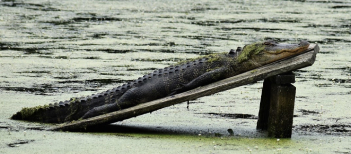FAQ's - Select question to reveal answer. Expand all | Collapse all
Is feeding alligators illegal?
Yes. Feeding alligators is illegal – once fed, alligators will lose their natural fear of people, begin approaching people, and start expecting food.
If you see someone feeding an alligator, call 1-800-922-5431.
What do alligators eat?
Alligators eat anything with meat. Depending on the size of the alligator, they will eat frogs, snakes, turtles, wading birds, fish, crabs, small mammals such as racoons and opossums, and occasionally deer and smaller alligators.
Why doesn’t SCDNR relocate alligators?
Relocating an alligator does not change its behavior and it will most likely cause problems for those in a new area.
Alligators have a strong homing instinct and will walk and swim miles to return to the place from which they were removed. They will often cross highways and neighborhoods to do this.
If moved to a “wild” place where it might not be a nuisance to people, it can cause major problems for the alligators already living there. Alligators have a complex social structure and will kill smaller alligators that move into their territory.
Moving wild alligators to captivity renders them useless to the population (they can no longer contribute babies to the wild population) and can introduce parasites and diseases into captive alligator groups.
Do alligators typically hunt on land or water?
Alligators do not hunt on land. They are ambush predators and use their camouflage to stay hidden and submerged in water to quietly approach prey.
Is it typical for an alligator to come on land and approach its prey?
An alligator on land is generally laying in the sun to warm their body temperature, or moving from point A to point B. When on land they feel exposed and at risk and are likely to take a defensive stance if approached.
Alligators will surge out of the water to catch a prey along the bank, so always be aware of your surroundings and stay a safe distance from the edge of the water.
What do I do if I see an alligator on the beach?
Give the alligator plenty of room to move on its own. It is likely using the ocean as a “highway” to get from one fresh body of water to another.
If the alligator seems in distress or a crowd has formed, call your regional nuisance alligator coordinator and they will determine the best course of action.
Do not crowd around to attempt to “help” the alligator.
What do I do if I see an alligator on the side of the road?
If the alligator is alive and is not obstructing traffic, leave it be. Given time, it will move on its own.
If the alligator is dead and is not obstructing traffic, leave it be and allow nature to take its course. You can also report it to Operation Game Thief (1-800-922-5431) and they will report it to SCDOT.
If the alligator is alive or dead and is obstructing traffic, call Operation Game Thief.
Should you run in a zigzag to escape an alligator?
No. It’s very rare for an alligator to chase someone on land.
While it’s true that alligators cannot turn quickly, they can run fast for short periods, and running in a zig-zag motion would just allow it to catch up with you quicker.
If you encounter an alligator on land, simply back away and give it plenty of space to leave on its own.
Can alligators climb my fence?
Yes. Alligators have been known to climb chain fences.
They are not climbing the fence to hunt; they are trying to travel from point A to B.
If one gets trapped inside your fence, open all gates, and allow it time to move on.
Can I have an alligator as a pet?
No. Alligators are wild animals and are difficult to care for in captivity.
Additionally, it is illegal to own alligators in any capacity without the proper permitting.
Permitting for captive alligators in South Carolina is limited and heavily regulated.

